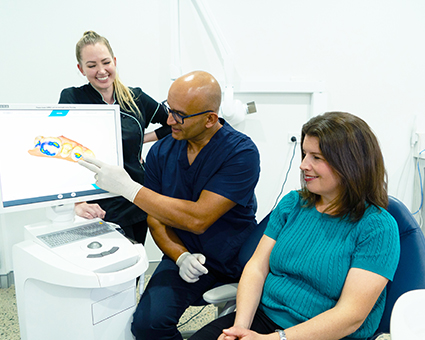Dental Crowns in Applecross & Mt Pleasant
 The term ‘crown’ is used to describe a type of dental restoration, (typically made out of porcelain, ceramic and/or metal) that can be used to help strengthen teeth that are too heavily broken down to be restored successfully with a simple filling.
The term ‘crown’ is used to describe a type of dental restoration, (typically made out of porcelain, ceramic and/or metal) that can be used to help strengthen teeth that are too heavily broken down to be restored successfully with a simple filling.
Simple fillings are generally used to restore teeth with small cavities or defects, where the tooth itself is still strong enough to support itself. Typically, a filling involves drilling the small defect away, then filling that defect with a restorative material and smoothing it over. It could be compared to patching a chipped wall by applying a plaster repair.
When a tooth is prepared for a crown, the entire tooth is trimmed down to make space for a restoration that glues over the top of the damaged tooth to reinforce the piece of tooth that’s left. This is a lot stronger than a simple ‘filling’. If a ‘filling’ is similar to plastering over a chipped wall, a ‘crown’ is similar to applying new bricks with some steel reinforcement.
- The tooth is trimmed to make space for the crown.
- An impression of the tooth is taken and sent to a dental laboratory.
- The dental laboratory is able to make a plaster model of the tooth, on which they can design and build a crown.
- The patient wears a temporary acrylic or ‘plastic’ crown (usually for two weeks) while the real crown is fabricated.
- The final crown is then fitted by the dentist at a second visit, usually under anaesthetic.
- The tooth is trimmed to make space for the crown.
- A digital scanner is used to take a series of images of the tooth. These are then used to create a virtual, digital 3D model.
- The crown is designed on this digital model and then ‘milled’ from a solid block of porcelain while-you-wait. This usually takes 15-30mins.
- The crown is then fitted by the dentist at that visit, with no temporaries, no impressions and no second visit.
Not only has CEREC technology made it more convenient for patients to receive dental crowns, it’s also made it easier for dentists to provide treatments such as ‘partial crowns’ ‘inlays’ and ‘onlays’- which in many cases can achieve the same goal of a ‘crown'; without the need to remove as much tooth structure to do so.
Book a Visit Today
Contact our dental clinic if you’d like to know more about CEREC crowns. We would be happy to show you how it works, and whether it could be used to help you!
CONTACT US

